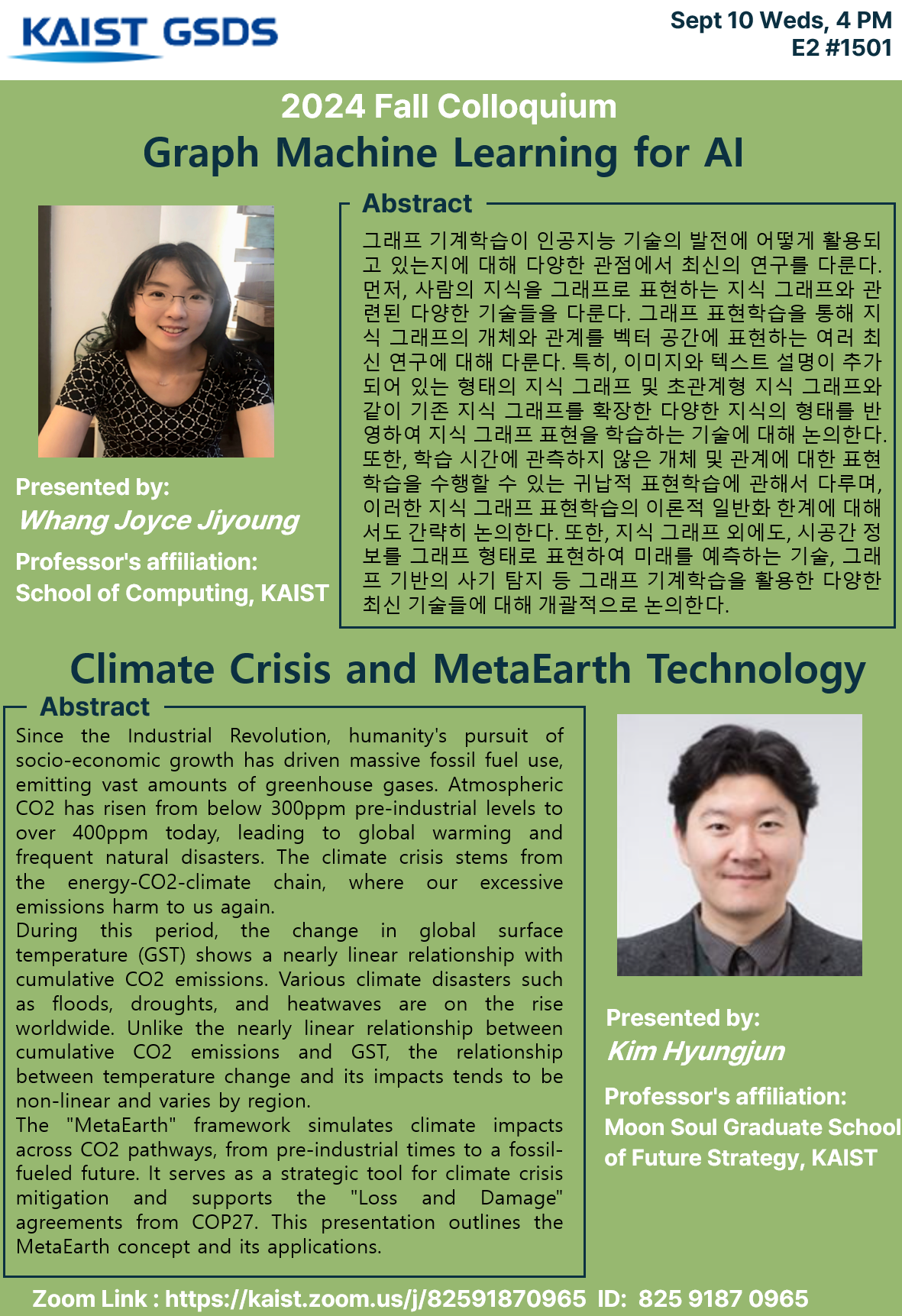GSDS 콜로퀴움이 다음과 같이 진행될 예정입니다.
# 날짜/시간: 2024년 9월 10일 화요일 16:00~17:00
# 장소: E2 1122호
# 연사: Prof. Joyce Jiyoung Whang (School of Computing) & Prof. Kim Hyungjun (Moon Soul Graduate School of Future Strategy)
# 제목: Graph Machine Learning for AI & Climate Crisis and MetaEarth Technology
# 초록 (Graph Machine Learning for AI) :
그래프 기계학습이 인공지능 기술의 발전에 어떻게 활용되고 있는지에 대해 다양한 관점에서 최신의 연구를 다룬다. 먼저, 사람의 지식을 그래프로 표현하는 지식 그래프와 관련된 다양한 기술들을 다룬다. 그래프 표현학습을 통해 지식 그래프의 개체와 관계를 벡터 공간에 표현하는 여러 최신 연구에 대해 다룬다. 특히, 이미지와 텍스트 설명이 추가되어 있는 형태의 지식 그래프 및 초관계형 지식 그래프와 같이 기존 지식 그래프를 확장한 다양한 지식의 형태를 반영하여 지식 그래프 표현을 학습하는 기술에 대해 논의한다. 또한, 학습 시간에 관측하지 않은 개체 및 관계에 대한 표현학습을 수행할 수 있는 귀납적 표현학습에 관해서 다루며, 이러한 지식 그래프 표현학습의 이론적 일반화 한계에 대해서도 간략히 논의한다. 또한, 지식 그래프 외에도, 시공간 정보를 그래프 형태로 표현하여 미래를 예측하는 기술, 그래프 기반의 사기 탐지 등 그래프 기계학습을 활용한 다양한 최신 기술들에 대해 개괄적으로 논의한다.
#초록 (Climate Crisis and MetaEarth Technology)
Since the Industrial Revolution, humanity's pursuit of socio-economic growth has driven massive fossil fuel use, emitting vast amounts of greenhouse gases. Atmospheric CO2 has risen from below 300ppm pre-industrial levels to over 400ppm today, leading to global warming and frequent natural disasters. The climate crisis stems from the energy-CO2-climate chain, where our excessive emissions harm to us again.
During this period, the change in global surface temperature (GST) shows a nearly linear relationship with cumulative CO2 emissions. Various climate disasters such as floods, droughts, and heatwaves are on the rise worldwide. Unlike the nearly linear relationship between cumulative CO2 emissions and GST, the relationship between temperature change and its impacts tends to be non-linear and varies by region.
The "MetaEarth" framework simulates climate impacts across CO2 pathways, from pre-industrial times to a fossil-fueled future. It serves as a strategic tool for climate crisis mitigation and supports the "Loss and Damage" agreements from COP27. This presentation outlines the MetaEarth concept and its applications.
-----------------------------------------------------------------------------------------------------------------------------------------------------------------------------------------------------------------------------------------------------------------------------------------------
GSDS dept. invites you to the following seminar.
# Time/Date : Sep. 10, 2024 (Tue) 16:00~17:00
# Location: Room 1122 in E2 building
# Presenter: Prof. Joyce Jiyoung Whang (School of Computing) & Prof. Kim Hyungjun (Moon Soul Graduate School of Future Strategy)
# Title: Graph Machine Learning for AI & Climate Crisis and MetaEarth Technology
# Abstract of Graph Machine Learning for AI : Graph machine learning is being leveraged for advancements in artificial intelligence from multiple perspectives. First, it covers various techniques related to knowledge graphs, where human knowledge is represented as a graph. The discussion includes several recent studies on representing entities and relations in knowledge graphs in vector space through graph representation learning. It particularly focuses on techniques for learning representations of knowledge graphs that incorporate different forms of knowledge, such as extended knowledge graphs that include images and textual descriptions, as well as hyper-relational knowledge graphs. Additionally, it addresses inductive representation learning, which enables learning representations for unseen entities and relations during training, and briefly discusses the theoretical generalization limits of such knowledge graph representation learning. Furthermore, beyond knowledge graphs, the discussion provides an overview of various state-of-the-art techniques utilizing graph machine learning, including methods for predicting future events by representing spatiotemporal information as graphs and graph-based fraud detection.
# Abstract of Climate Crisis and MetaEarth Technology Since the Industrial Revolution, humanity's pursuit of socio-economic growth has driven massive fossil fuel use, emitting vast amounts of greenhouse gases. Atmospheric CO2 has risen from below 300ppm pre-industrial levels to over 400ppm today, leading to global warming and frequent natural disasters. The climate crisis stems from the energy-CO2-climate chain, where our excessive emissions harm to us again. During this period, the change in global surface temperature (GST) shows a nearly linear relationship with cumulative CO2 emissions. Various climate disasters such as floods, droughts, and heatwaves are on the rise worldwide. Unlike the nearly linear relationship between cumulative CO2 emissions and GST, the relationship between temperature change and its impacts tends to be non-linear and varies by region. The "MetaEarth" framework simulates climate impacts across CO2 pathways, from pre-industrial times to a fossil-fueled future. It serves as a strategic tool for climate crisis mitigation and supports the "Loss and Damage" agreements from COP27. This presentation outlines the MetaEarth concept and its applications.



